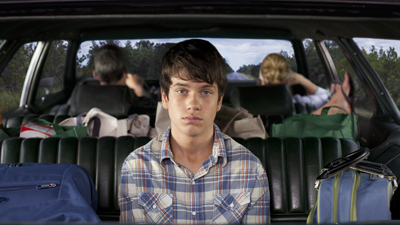










"Although [writer-directors Nat Faxon and Jim Rash] won an Oscar for their adaptation of The Descendants—despite the public claims of director Alexander Payne (who egregiously snubbed them at the ceremony) that he’d thrown out their work and started over—their background is in sitcoms and improvisational comedy. They’re primarily writers and actors, not directors. They keep adding comebacks, filling up pauses, leaving nothing unsaid. Characters like the dipsomaniacal divorced neighbor Betty (Allison Janney) make strong entrances and then go and on in the same vein—past the point where you get it, you get it, to the point where you’re ready to move on. The story doesn’t feel dramatized. It feels pitched."



A BBC Moving Pictures special on Dennis Hopper, from 1994.




